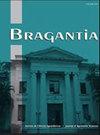矿山副产品作为农业石灰材料的效率和锌的来源
IF 1.5
4区 农林科学
Q2 AGRICULTURE, MULTIDISCIPLINARY
引用次数: 1
摘要
摘要:大多数巴西土壤对农业用途的限制与酸度和养分的可用性有关。本研究旨在评估锌(Zn)和铅(Pb)开采副产品(Zincal™), 关于其校正土壤酸度和作为锌来源的能力。为了评价其疗效,将其与白云石+硫酸锌进行了比较。该实验在两种土壤中进行,一种是石英质新溶胶,另一种是红色Latosol,并在实验室的受控条件下进行。处理包括施用两种剂量,目标是两种石灰材料的75%和95%的碱饱和度,以及在没有酸度校正的对照处理中。在120天内评估了所述处理对pH、碱饱和度、Al3+、H+Al、Ca2+、Mg2+、Zn、Mn和Pb含量的影响。两种石灰材料在提高土壤pH值、降低Al3+和潜在酸度(H+Al)以及增加碱饱和度方面都获得了类似的响应。在这些属性中观察到的差异与剂量有关。就Ca和Mg而言,土壤中释放的含量与石灰材料中的含量相关。Zincal™ 比白云石释放更多的Mg和更少的Ca,因此被证明是有效释放锌的。本文章由计算机程序翻译,如有差异,请以英文原文为准。
Efficiency of a mine by-product as agricultural liming material and source of zinc
ABSTRACT Most Brazilian soils have restrictions on agricultural use related to acidity and nutrient availability. This study aims to evaluate a zinc (Zn) and lead (Pb) mining by-product (Zincal™), regarding its capacity to correct soil acidity, and to serve as a source of Zn. For evaluation of its efficacy, a comparison with dolomite + Zn sulfate was conducted. The experiment was set up in two soils, a Quartzarenic Neosol and a Red Latosol, and conducted under controlled conditions in the laboratory. Treatments consisted in the application of two doses, aiming at 75 and 95% base saturation of both liming materials, as well as in a control treatment without acidity correction. The effect of said treatments on pH, base saturation, Al3+, H+Al, Ca2+, Mg2+, Zn, Mn and Pb contents were evaluated over 120 days. Similar responses were obtained from both liming materials, regarding their capacity to increase the pH of the soil, reduce Al3+ and potential acidity (H+Al), and increase base saturation. Differences observed in these attributes were dose-related. In regard to Ca and Mg, the content released in soil correlates with the content present in the liming materials. Zincal™ released more Mg and less Ca than dolomite, hence proving to be efficient in releasing Zinc.
求助全文
通过发布文献求助,成功后即可免费获取论文全文。
去求助
来源期刊

Bragantia
AGRICULTURE, MULTIDISCIPLINARY-
CiteScore
2.40
自引率
8.30%
发文量
33
审稿时长
4 weeks
期刊介绍:
Bragantia é uma revista de ciências agronômicas editada pelo Instituto Agronômico da Agência Paulista de Tecnologia dos Agronegócios, da Secretaria de Agricultura e Abastecimento do Estado de São Paulo, com o objetivo de publicar trabalhos científicos originais que contribuam para o desenvolvimento das ciências agronômicas.
A revista é publicada desde 1941, tornando-se semestral em 1984, quadrimestral em 2001 e trimestral em 2005.
É filiada à Associação Brasileira de Editores Científicos (ABEC).
 求助内容:
求助内容: 应助结果提醒方式:
应助结果提醒方式:


